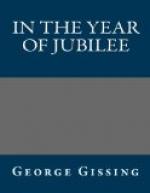Nancy ate her sandwich and smiled. The one glass sufficed her; Crewe drank three. Presently, looking at her with his head propped on his hand, he said gravely:
‘I wonder whether this is the last walk we shall have together?’
‘Who can say?’ she answered in a light tone.
‘Some one ought to be able to say.’
‘I never make prophecies, and never believe other people’s.’
‘Shows your good sense. But I make wishes, and plenty of them.’
‘So do I,’ said Nancy.
‘Then let us both make a wish to ourselves,’ proposed Crewe, regarding her with eyes that had an uncommon light in them.
His companion laughed, then both were quiet for a moment.
They allowed themselves plenty of time to battle their way as far as Westminster Bridge. At one point police and crowd were in brief conflict; the burly guardians of order dealt thwacking blows, right and left, sound fisticuffs, backed with hearty oaths. The night was young; by magisterial providence, hours of steady drinking lay before the hardier jubilants. Thwacks and curses would be no rarity in another hour or two.
At the foot of Parliament Street, Nancy came face to face with Samuel Barmby, on whose arm hung the wearied Jessica. Without heeding their exclamations, she turned to her protector and bade him a hearty good-night. Crewe accepted his dismissal. He made survey of Barmby, and moved off singing to himself, ’Do not forget me—do not forget me—’
Part II: Nature’s Graduate
CHAPTER 1
The disorder which Stephen Lord masked as a ‘touch of gout’ had in truth a much more disagreeable name. It was now twelve months since his doctor’s first warning, directed against the savoury meats and ardent beverages which constituted his diet; Stephen resolved upon a change of habits, but the flesh held him in bondage, and medical prophecy was justified by the event. All through Jubilee Day he suffered acutely; for the rest of the week he remained at home, sometimes sitting in the garden, but generally keeping his room, where he lay on a couch.
A man of method and routine, sedentary, with a strong dislike of unfamiliar surroundings, he could not be persuaded to try change of air. The disease intensified his native stubbornness, made him by turns fretful and furious, disposed him to a sullen solitude. He would accept no tendance but that of Mary Woodruff; to her, as to his children, he kept up the pretence of gout. He was visited only by Samuel Barmby, with whom he discussed details of business, and by Mr. Barmby, senior, his friend of thirty years, the one man to whom he unbosomed himself.
His effort to follow the regimen medically prescribed to him was even now futile. At the end of a week’s time, imagining himself somewhat better, he resumed his daily walk to Camberwell Road, but remained at the warehouse only till two or three o’clock, then returned and sat alone in his room. On one of the first days of July, when the weather was oppressively hot, he entered the house about noon, and in a few minutes rang his bell. Mary Woodruff came to him. He was sitting on the couch, pale, wet with perspiration, and exhausted.




